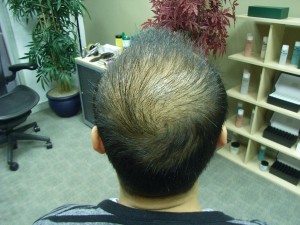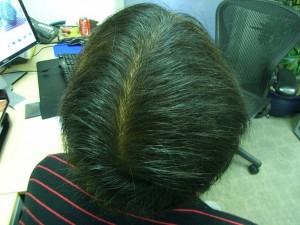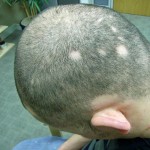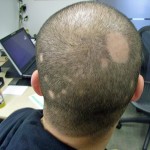10.01.2009
in Uncategorized
Popular hand-held laser device LaserComb might revive follicles for some men. Maybe.

Americans spend billions on hair-care products each year, a remarkable investment for a part of the body with no real function. We clean it, nourish it and style it — and we definitely mourn its loss.
Lots of products and procedures promise to restore thinning or disappearing hair. One especially intriguing option is the HairMax LaserComb, a hand-held laser device that supposedly revives hair follicles. Hailed on TV news programs as a potential “cure for baldness,” the device received FDA clearance for men in 2007. Unlike drugs, most medical devices can be approved without rigorous testing. A company must merely persuade the Food and Drug Administration that the new device is “substantially equivalent” to other products already on the market. In this case, the makers of the LaserComb told the agency that their product was roughly as safe and effective as a wide range of other laser devices, including a gadget intended to kill lice. They also claimed to be in the same league as the Evans Vacuum Cap, an early 20th century hair-growth contraption that’s pretty much what it sounds like.
The LaserComb is sold online and through the SkyMall catalog for about $500.
Users are instructed to slowly move the comb back and forth through their remaining hair for 10 to 15 minutes at a time, three days a week.
The claims
According to the HairMax website, “90% of HairMax users notice positive benefits starting in as little as 8 weeks. These results include: increased hair growth, cessation of hair loss, faster growing hair, more manageability and more vibrant color.”
David Michaels, the managing director of Lexington International, the company behind the LaserComb, says it works by “transferring light energy to cellular energy” in the follicles. The device can’t restore hair to a bald spot, he says, but it can make any remaining hair grow “faster, thicker, heavier and stronger.”
The bottom line
Lasers can undoubtedly encourage hair growth, says Dr. Marc Avram, a clinical associate professor of dermatology at Weill Cornell Medical College in New York City.
In fact, a small percentage of people who undergo laser hair removal end up with more hair than they had to start with. As Avram and colleagues noted in a 2007 issue of the Journal of Cosmetic and Laser Therapy, many hair-loss centers offer treatment with low-level laser devices, and some patients really do seem to benefit. Nobody knows why hair responds to lasers, he explains, although it’s possible that the beams somehow encourage blood flow to the follicles.
Still, according to Avram, there’s no good evidence that the LaserComb works any better than more-established treatments such as the prescription medications Rogaine or Propecia. For his patients who are unwilling or unable to use the medications, he says that the device could be worth a try. The LaserComb is safe, he says, and it just might help. “But I set low expectations for it.”
Avram recently tested the HairMax LaserComb on a handful of patients in his office over six months. (Contrary to claims made for the LaserComb, Avram says, it takes at least six months to see real results from any hair-loss treatment.)
“In 20% of the subjects, it seemed to maybe have an effect” on the appearance of hair, Avram says. The study hasn’t been published yet, and it didn’t include a control group for the sake of comparison. Avram readily admits his study “isn’t definitive,” but he hopes it might encourage more research in the future.
By contrast, Rogaine and Propecia have already been tested in multiple high-quality studies and have been shown to stop hair loss in 80% to 90% of patients, Avram says.
Uncertainty aside, the LaserComb has clearly captured the public’s imagination. Patients ask about it “all the time,” says Dr. Paradi Mirmirani, a dermatologist with the Kaiser Permanente Vallejo Medical Center and a member of the North American Hair Research Society. Mirmirani says the device could potentially stimulate hair growth. “But I don’t have any evidence. If patients want to spend $500 on this device, it’s their choice. But I wouldn’t recommend it. They should save it for something that we know actually works.”
Last May, the FDA issued a warning letter against Lexington International for illegally marketing the device to women when it had been officially cleared only for men. The HairMax website now says that the device is intended for men only, but recorded messages for callers on hold to customer service still say that it “works equally well on both men and women” and that “anyone of any age, male or female, can benefit.”
Michaels says the company has asked the FDA for approval to market the device to women and expects a decision soon.
Do you have Hair Loss Problems, read our Hair Loss Help











